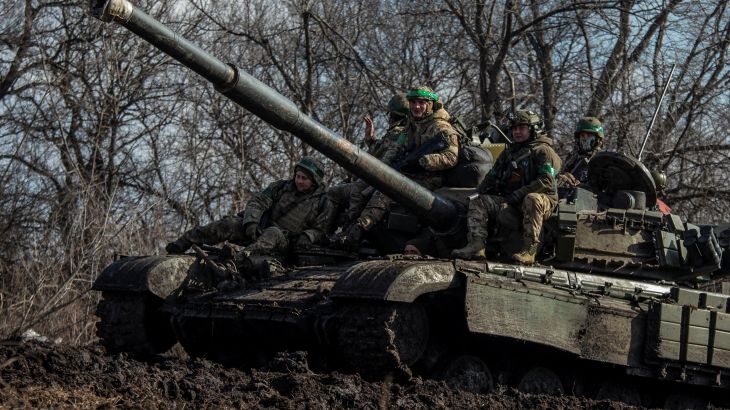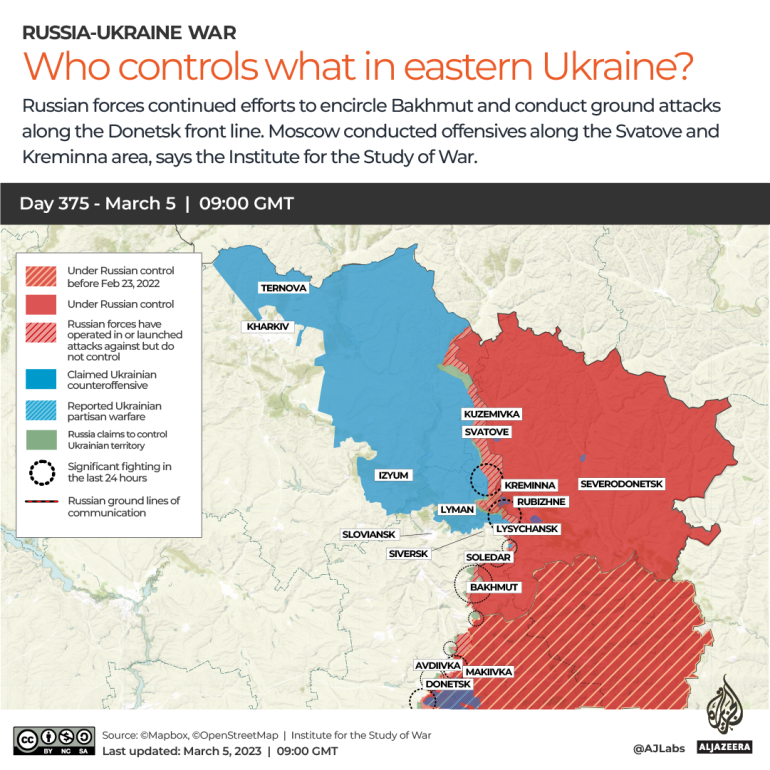Ukraine pledges to defend ‘fortress Bakhmut’ as battle rages
Kyiv says it is holding off attacks from Russian forces attempting to surround the eastern Ukrainian city.

Kyiv has said it is holding off attacks from Russian forces still attempting to surround Bakhmut, a near-destroyed eastern Ukrainian city that Moscow has been trying to capture for months.
Ukraine has pledged to defend “fortress Bakhmut” but has faced Russian troops determined to take the city that has become a political prize as the battle drags on.
Keep reading
list of 4 itemsPhotos: Ukrainian forces defending Bakhmut as civilians flee
Civilians flee Ukraine’s Bakhmut as battle rages for eastern city
Wagner chief urges Ukraine’s Zelenskyy to abandon Bakhmut
The Ukrainian general staff said “more than 130 enemy attacks” had been repelled over the past day, including in Kupiansk, Lyman, Bakhmut and Avdiivka.
“The enemy continues its attempts to encircle the town of Bakhmut,” it said on Sunday morning.
Bakhmut has been mostly reduced to rubble during the longest and bloodiest battle of the invasion.
Ukrainian President Volodymyr Zelensky on Sunday said Kyiv’s forces were in a “painful and difficult” battle in the eastern Donbas region, which includes Bakhmut.
“I would like to pay special tribute to the bravery, strength and resilience of the soldiers fighting in the Donbas,” Zelenskyy said in his daily address, adding “this is one of the hardest battles. Painful and difficult.”
Sergiy Cherevaty, a spokesman for Ukrainian forces, said on Saturday the situation was “difficult but under control” in the city he described as a “priority target for the enemy”.
Ukrainian Defence Minister Oleksii Reznikov told Germany’s Bild am Sonntag newspaper: “The Russians’ losses run to 500 killed and wounded every day.”
The casualty figures could not be independently verified.
According to Reznikov, Bakhmut is “a symbolic place for the Russians”, which is why they are making such efforts to capture it. However, its capture would mean nothing for the further course of fighting in the eastern Donbas region, he told the newspaper.

There is fighting in and around the city, the US-based Institute for the Study of War (ISW) said, warning that Ukrainian supply routes were narrowing.
“The Russians may have intended to encircle Ukrainian forces in Bakhmut, but the Ukrainian command has signalled that it will likely withdraw rather than risk an encirclement,” ISW said on Saturday.
Ukraine and Russia have since the summer fiercely fought for the city, whose symbolic importance has surpassed its military significance.
‘Fighting with shovels’
Russian reservists are reportedly being armed with shovels due to a shortage of munitions, the British Ministry of Defence wrote on Twitter in its latest intelligence update.
Last month, Russian mobilised reservists had described being ordered to assault a Ukrainian concrete outpost armed with only “firearms and shovels”, according to the ministry.
“The lethality of the standard-issue MPL-50 entrenching tool is particularly mythologised in Russia,” the ministry tweeted.
“Little changed since it was designed in 1869, its continued use as a weapon highlights the brutal and low-tech fighting which has come to characterise much of the war.”
The ministry said recent evidence suggested there had been an increase in close combat in Ukraine, adding that there was probably “less support from artillery fire because Russia is short of munitions”.
The ministry has been publishing daily updates on the progress of Russia’s war on Ukraine since it began in February last year, in an attempt to counter the Russian narrative. The British updates are dismissed by the Kremlin as propaganda.
Rivalries
Pro-Russian separatists in the Donetsk region posted a video purporting to show Wagner fighters in the suburbs north of Bakhmut, having taken control of the Stupki railway station.
Wagner, a private army headed by Yevgeny Prigozhin, has taken centre stage in the fight for the city, which has exposed rivalries with Russia’s conventional forces.
Prigozhin has previously recruited men from Russian prisons. Among these prisoners in particular, casualties are reported to be extremely high.
The human rights organisation “Russia Behind Bars” recently said of the 50,000 mercenaries recruited in prisons, only 10,000 were still at the front. The rest had fallen, been wounded, captured or deserted.
On Friday, Prigozhin said his fighters had “practically encircled” Bakhmut, and only one road remained under Ukrainian control.
Prigozhin has for weeks been publicising the advances of his men towards the eastern city.
He regularly posts videos of himself alongside mercenaries, on the ground or even in a fighter jet, in contrast with Russian generals criticised for shirking the front line.
In a rare exception, Russia on Saturday released a video of Defence Minister Sergei Shoigu inspecting troops in front-line regions in Ukraine.
The ministry said Shoigu inspected an advance command post in the south Donetsk direction, without specifying exactly where or when.
He was seen travelling in a helicopter and talking to a soldier in front of damaged buildings.
The ISW think tank said Shoigu went there “likely to assess the extent of Russian losses around Vugledar and the possibility of a further offensive in this direction”.
Later on Sunday, Russia said its army hit a command centre of the Ukrainian forces’ Azov Regiment in the southeastern Zaporizhia region.
The defence ministry did not elaborate on the attack in its daily update on what Moscow terms the “special military operation” in Ukraine.
The Azov Regiment, which had far-right and ultranationalist origins and is now a unit of Ukraine’s national guard, garnered international attention for its resistance to the Russian siege of Mariupol’s vast steelworks last year.
Zaporizhia is one of the four regions – along with Donetsk, Luhansk and Kherson – that Russia claims to have annexed but never fully controlled.